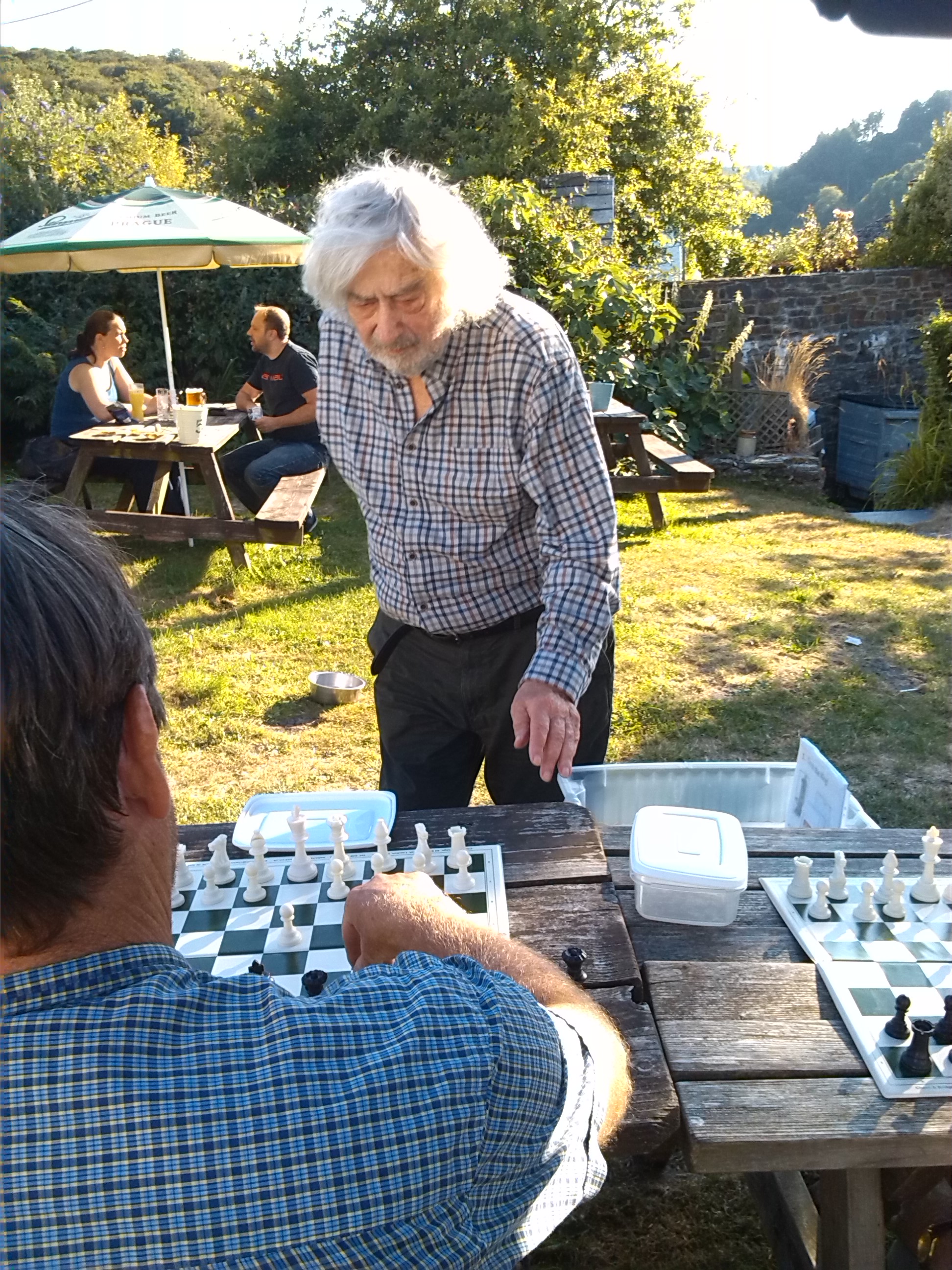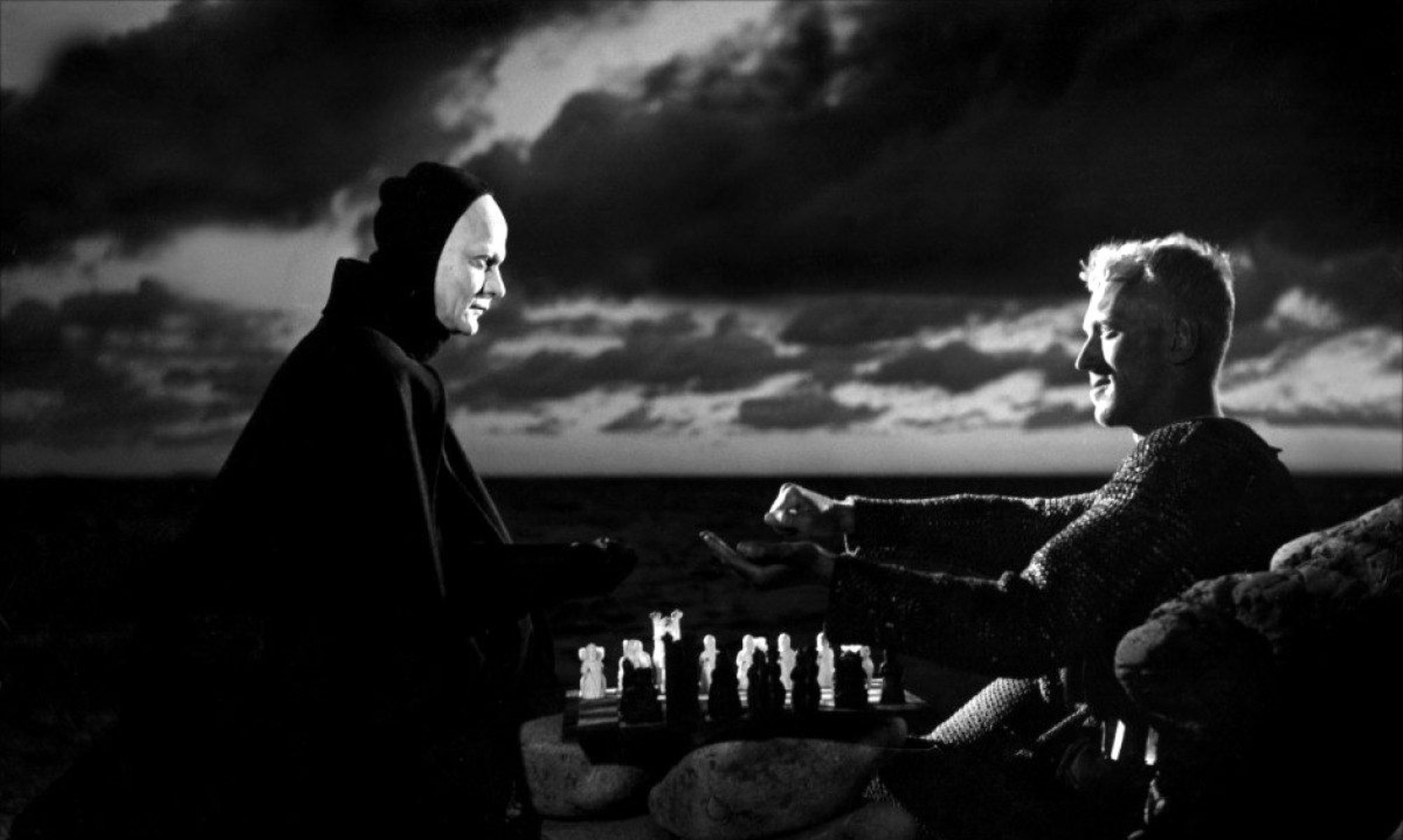In the hope that readers might be interested in my local efforts as a chess journalist I have assembled excerpts from five articles all of which were published either on the Chess Cornwall website or as Calstock Chess Club Facebook posts. I usually try try to be amusing as well as perceptive, although can be serious as well.
A ‘swindle’ stalemate
From ‘What’s in a Name’?, this piece comments wryly on the recent adoption of exotic names by our Calstock clubs who have added terms like ‘Killers’ and ‘Clowns’ to their team’s nomenclature. This excerpt is from a match report.
David on board three miscalculated a relatively familiar position as black in the Benko gambit, allowing Boris to exchange a rook for two minor pieces and a pawn. He had some compensation due to advancing pawns down the g and h files but moved the wrong one to the seventh rank, allowing both eventually to be neutralised. Eventually David managed to ‘swindle’ a draw in an absolutely lost position by sacrificing both his rooks, trying to look crestfallen rather than eager as he offered the first ‘poisoned’ one, hoping Boris would see it as a blunder. The capture of the first rook allowed the second rook to sacrifice itself to the king, creating stalemate. Boris shook David’s extended hand, assuming it was all his elegant way of meeting fate at the door, before the grinning spectators alerted him to what had happened. Undeserved luck seems the most appropriate verdict on DJ’s evening.
On board 4 Andy lost to Peter in a strange encounter. Andy played his trademark King’s Gambit, which was accepted, to which he replied with the standard Nf3. Peter’s response was Bc5, regarded by opening theory as the ninth best move in the situation (!) and gagging for d4 followed by opening up the f file by attacking the pawn on f4. But Andy carried on regardless with his usual plan as if nothing had happened. Eventually the Black bishop, which had retreated up the diagonal, was pinning Andy’s pawn on d4 against his King, creating an outpost for a black knight on e5. By the time Andy was two moves away from opening up the f file, Peter had castled queen side and was already moving in the furniture. It continued in a similar vein. We all have bad days, for sure, so sympathy is in order, not the wagging finger.

The educational value of chess
From ‘Observations on Junior Chess’, this article is written in a more serious vein and deals with the question of whether chess’s educational value makes a case for as a recognised part of the school curriculum. This excerpt deals with chess and the development of multi-faceted skills, particularly generic cognitive aspects:
With regard to multi-faceted competence development, one obvious value of chess in education is that it requires a juggling of multiple considerations, thus echoing many of the complex practical life situations in which bundles of individual competences need to be applied. As AI (artificial intelligence) guru Seymour Papert put it, ‘Chess is a set of gears that complement one another, and so contribute to the development of general ability’. The Kasparov Chess Foundation Europe made a similar point in depicting chess as calling upon and developing focus, visualisation, planning ahead, weighing options, calculating risk, analysing correctly and thinking analytically. In Piagetian terms, chess facilitates movement between concrete thinking (the pieces and the position) and abstract thinking (the motifs and ideas). Chess is also a ‘noble’ social game with a tradition, largely upheld, of courtesy. At every level players lose, and are expected to learn graciousness in defeat. There have also been therapeutic claims made on its behalf, e.g. in the Manhattan Community College report Chess in Schools: ‘A Wise Move’ (1995).
Although the cognitive neurological evidence is still pretty speculative there is some suggestion that exposure to chess, seen as ‘abstract language’ like Music and Maths, creates neural pathways that internalise generic patterns that predispose the learner to interpret more easily similar implicit or latent structures when they are encountered. The same kind of thinking underpins the so-called ‘Mozart effect’ in which listening to music alongside a task is said to promote learning ‘under the radar’ without necessarily involving conscious intention. There is considerable fashionable interest in the value of a ludic pedagogy, fuelled in part by the emergence of game theory as a serious academic specialism with such books as Ken Binmore’s ‘Fun and Games: a Text in Game Theory’. Game theory covers both strategy considerations in actual games and the significant presence of game-like structures found widely in everyday life. Games are self-evidently motivational activities and playing games gives insights into game-like structures that are not themselves literal games but also allows cross-schematic deep understandings. Games like chess have the advantage of offering virtually immediate positive or negative feedback, a consideration held to be advantageous in learning theory. If you make a bad move your position deteriorates immediately. Games of various kinds have virtually infiltrated almost every area of the school curriculum, often premised on a subject-based simulation. The claims of chess as a general pedagogical tool are not yet as advanced, as they deserve.

And it is clearly enjoyable, too!
Cognitive psychology and chess
Sometime back I got interested in what cognitive psychology had to say about high level performance in Chess, in particular in a simultaneous display, and came across ‘chunking theory’. The interest was sparked by a simul given by IM Andrew Greet in the Calstock Arts Centre. The account is a bit technical but worth following up for those interested in such relatively arcane matters. Others can give it a miss!
Fernand Gobet, the principal investigator for Studies in Chess Expertise at the University of Nottingham’s ESRC Centre for Research in Development, Instruction and Teaching some time ago developed and tested theoretical models for chess expertise and sought experimental and empirical support for them. The focus was on how memory, perception and attention processes meld in highly skilled performance.
Towards the top of the chess food chain, it is more commonly asserted, outstanding results are more to do with what Chase and Simon in ‘The Mind’s Eye in Chess’ (W. G. Chase (1973) Visual Information Processing (1973) call ‘chunking theory’, in effect a form of pattern recognition. Those interested in seeing how Gobet has extended the model and how it might be related indirectly to skill at playing simuls, might take a look at Gobet and Simon ‘s ‘Templates for Chess Memory: a mechanism for recalling several boards’ (1996) in Cognitive Psychology 31.
Lord David addresses his team before the battle
The Cornwall Devon inter-county match is always a difficult gig as we are traditionally substantially out-graded. As a part of the annual psychops, in January 2014 match captain DJ decided the time was appropriate to offer his depleted men an Agincourt-style speech prior to the battle. Such hubris is traditionally punished by the gods, but this time the stratagem worked and Cornwall’s fragile chess honour was upheld.
Lord David
O that we now had here
But five hundred and a dozen feudal chessmen
As pawns, knights, bishops, castles, queens and Kings
And working clocks. O that we had a stronger team!
Some Cornish clubmen decided not to play
And push no pawns today.
King Jeremy
What’s he that wishes so?
What lapse of nerve is this? No my Welsh cousin
The fewer men the greater share of honour.
God’s will I pray thee, wish not one man more.
It grieves me not if lusty singers in a Truro choir
Prefer their bishops made of flesh and blood.
Such dross, the Gospels tell, no kingdom can inherit.
But if it be a sin to covert honour
I am the most offending soul alive.
Let he depart who has no stomach for this fight.
This sacred day is called the feast of Andrew
He that outlives this day and comes safe home
Will stand a tip-toe when this day is nam’d,
And rouse him at the name of Andrew.
He that shall live this day and see old age
Will yearly on the vigil feast his club mates
And say: “Tomorrow is St Andrew’s Day”.
Then will he fetch his board, set out the bits
And say: “This set secured my famous win
Against a cider drinker with a higher grade”.
I sacked and mated him, his flag about to fall.
What feats we did that day! Our names will be
Familiar in the mouth as household words
Bartlett, Csuri, Hassall, Healey and Hooker.
Jenkins, Menadue, Nicholas and Retallick.
Saqui, Selwood, Slade, Smith and Trudeau.
And lasting glory too for Webb and Wilman:
All in the flowing cups freshly remembered.
Their games shall Fritz and masters analyse
Reshaping standard theory of the middle game
St. Andrew’s festive day shall ne’er go by
From this day to the ending of the world
Without the Victory Hall brought back to mind.
He that plays gambit lines for me, or forks and pins
Or takes a crowbar to Berlin’s defensive wall
Shall be my brother. Be he ne’er so patzer
This day will energise his chess and make him expert
In the Semi-Slav or else whatever opening played.
Chorister Kneebone, singing beneath a vaulted roof
Shall think himself accursed he was not here
And hold his manhood cheap while any speaks
That fought with us upon St. Andrew’s Day.
What comes along, goes along
Cornwall has produced more that its fair share of junior players who have achieved national recognition. One such character, coincidentally named Bude, appears in the plot of Spurious Games. This article, An Appreciation of Theo Slade was written for the Cornish chess website in appreciation of Theo. Now more than a foot taller, he is making a name for himself playing and teaching chess in the States. He returned last year to give a simul at the Boot Inn, Calstock, my home venue.
It was at the Bude Quickplay that the Cornish chess world heard of the imminent departure of its brightest up-and-coming star to the United States. The rumours circulated quickly: Theo Slade was off to play the professional chess hustlers in Washington Square and become a dollar millionaire. That turned out not to be quite the whole story, since Theo intends spending as much chess time as possible studying and practising his chess skills under the expert guidance of his recently acquired coach the Danish GM Lars Bo Hansen. As captain of the Cornish team, my first selfish thought was whether Theo would be playing for us in the local derby against Devon at the end of the month. ‘Actually, the family are leaving tomorrow’, replied Andrew a trifle sheepishly, ‘we did not spread the word in case the visas did not come through’. Thus, fortuitously, in the final I was Theo’s opponent for his last game on Cornish soil before emigrating, in which he put my trademark Latvian Gambit to the sword.
Eightieth Birthday Simul at the Ship Inn, Lerryn
Although chess players tend to be an aging population, there is some convincing evidence that playing chess regularly has the effect of slowing the process of aging, particularly in the brain cell department. In an attempt to prove the point, David celebrated his eightieth birthday by giving a simultaneous display in a challenge match against judiciously selected players from the Lerryn and Liskeard Chess clubs at the Ship Inn Lerryn, winning comfortably with the loss of only four games.
David reports that he was expecting to lose and saw it as the first act in a Buddhist renunciation of further ambition in this transient world, but natural competitiveness appears to have kicked in. So, his process of ‘learning to let go’ has had to be postponed. For the party following the simul, David had brought along a poem to read on the theme of old age, Sailing to Byzantium by WB Yeats:
An aged man is but a paltry thing,
A tattered coat upon a stick, unless
Soul clap its hands and sing, and louder sing
For every tatter in its mortal dress…
And therefore I have sailed the seas and come
To the holy city of Byzantium.
His prepared theme was that chess had come to the west via Byzantium, first in a form of chess played on a round board called Byzantine Chess, but as he was about to read the poem and make the connection an amazing coincidence occured. The management of the Ship Inn, our never less than wonderful hosts, had prepared a surprise birthday cake. And low and behold it was in the form of a Byzantine chess set, edible chess pieces and all.
David was able to use it as a visual aid in his speech, but everybody thought it was a stitch up rather than a piece of pure serendipity. Of those present, only Gary Trudeau expects such coincidences to occur routinely in everyday life.

[November 2014]

